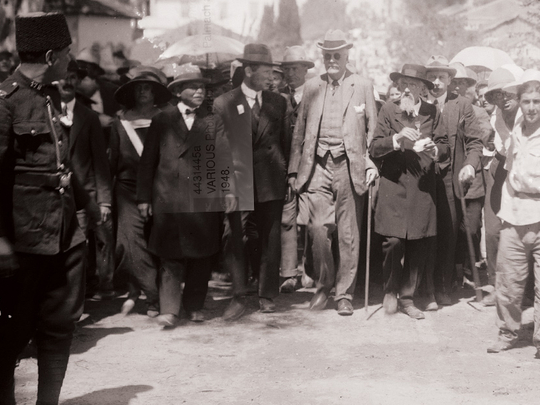
A letter penned by Britain’s then foreign secretary Arthur James Balfour to the country’s Jewish community leader Baron Walter Rothschild on November 2, 1917, asserting that Her Majesty’s Government viewed the creation of a national home for the Jewish people, paved the way for a land grab eliciting decades of misery and a conflict deemed “intractable”. That was the pebble that created huge waves of blood that still engulf the Palestinian sons of the soil.
Britain’s Prime Minister Theresa May looks forward to celebrating the declaration’s centenary with “pride”, notwithstanding that her Foreign Secretary Boris Johnson once referring to it as a “bizarre”, “tragicomically incoherent” missive. The Palestinian President, Mahmoud Abbas, has condemned the proposed celebration, instead calling upon the United Kingdom to issue an apology for all the sufferings that declaration has triggered.
A petition launched by the Palestinian Return Center on the website of Britain’s parliament also demanded an apology.
SPECIAL COVERAGE ON BALFOUR DECLARATION:
Ramzy Baroud writes: How Britain became an obstacle to peace
Fawaz Turki writes: Dear Mr Balfour, your Zionist wrongs will be corrected
Jumana Al Tamimi writes: 67 words that changed course of Arab history
Mahmoud Abbas writes: Why Britain must say sorry for a century of injustice
Diana Buttu writes: We live a life of fear in an open-air prison
Fadi Esber writes: How Truman paved the way for Jewish occupation
“We are proud of our role in creating the state of Israel,” was the British government’s response. Is the government also proud of its role in creating refugees, wars, apartheid walls, child prisoners, torched orchards and olive groves, illegal colonies, demolished homes, I wonder.
The irony is this: Balfour’s decision was not prompted by any personal affinity for the Zionist movement. It was made purely to serve British interests. Like many of his establishment peers, Balfour was an anti-Semite who resented Jews living in Christian Europe.
As Middle East analyst Lamis Andoni has underscored, Balfour sought to solve what he termed as “the European problem” as evidenced by his introduction to Nahum Sokolow’s book History of Zionism.
It is “a serious endeavour to mitigate the age-old miseries created for western civilisation for the presence in its midst of a body that it too long regarded as alien and even hostile, but which it was equally unable to expel or absorb. Surely, for this if for no other reason it [Zionism] should receive our support,” he wrote.
Another of Balfour’s objectives was focused on inveigling prominent American Jews to pressure their government to intervene in the Second World War. Some historians believe the letter was meant to bribe the Zionist movement’s leader, Chaim Weizmann, an accomplished biotechnologist, to develop a synthetic cordite gun powder when imports of cordite’s crucial ingredient acetone dried up, which he succeeded in doing.
For all kinds of reasons, the Balfour Declaration cannot be considered as one of the British Imperialist Empire’s finest moments. It not only blessed the giving away of land that was not Britain’s to give, it was also a betrayal of a promise that London made to Arab leaders who fought alongside British troops to oust the Ottomans from the region. They were assured of independence “in the limits and boundaries proposed by the Sherif of Makkah”.
Zionists have a very different take. They believe the land they call Eretz Israel, encompassing Judea and Samaria (West Bank), was promised by God as though the Creator is a real estate broker. To this day, they maintain the deceit that Palestine was a land without a people, when this lie is easily disproved — thanks to the existence of black-and-white films as well as newsreels showing the cities of Jaffa, Haifa, Jerusalem and others throbbing with life. Entire villages and farming communities have since been erased from the face of the earth and from history books.
That said, I cannot blame Jews who suffered centuries of persecution in Europe and Russia for seeking a place of safety and security that they could call home and the fact that so many sought sanctuary in Palestine during the Nazi Holocaust, when all other doors were shut fast, is understandable. If we are honest, all of us would have done the same thing in those circumstances.
When the newcomers first began arriving they were welcomed by Palestinians known for their hospitable nature. Little did they know that they would be subjected to a campaign of terror waged by Jewish terrorist groups, including the Irgun and Lehi gangs that massacred up to 150 inhabitants of Deir Yassin — among them women and children.
Palestinian families fled for their lives in the belief they would soon return. Their grandchildren eking out a living in camps today maintain that hope. Most of those who stayed face daily hardships and humiliation at the hands of the occupiers or have been packed into the world’s largest open prison Gaza at the mercy of Israeli missiles.
The idea of creating a Jewish state was worthy, but not at the cost of the indigenous population. There were several other alternatives in various parts of the world that were virtually unpopulated, but those floated were refused by the Zionists.
Weizmann wrote how he had fought for Palestine in his memoir: “‘Mr Balfour, suppose I was to offer you Paris instead of London, would you take it?’ He sat up, looked at me, and answered: ‘But Dr Weizmann, we have London.’ ‘That is true,’ I said, ‘but we had Jerusalem when London was a marsh’.” That same arguments stand for the Palestinians who are expected to accept the crumbs that Israel cares to throw their way.
Britain’s pride is nothing but arrogance. May wants to dance upon Palestinian graves and gloat over their agony. She and her government should be ashamed of their heartless, insensitive stance.
Linda S. Heard is an award-winning British political columnist and guest television commentator with a focus on the Middle East.










